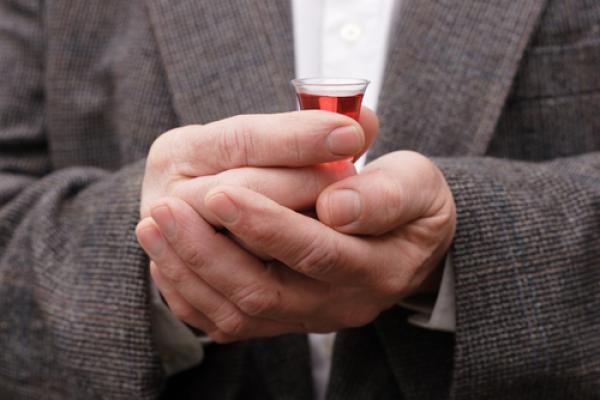As the flu outbreak spreads across 48 states, some religious leaders are advising their flocks to take precautions, but others say avoiding infection is just a matter of common sense.
Several Catholic dioceses, including Manchester, N.H., Boston, and New York, are advising priests to consider not offering the shared chalice of consecrated wine at Holy Communion at Masses. Communicants would only receive the consecrated wafer.
In addition, Manchester Bishop Peter Libasci had other suggestions, reported The Eagle Tribune of North Andover, Mass.
“The faithful should be encouraged to share the Sign of Peace without touching hands or kissing,” he said. “This may be done with smiles and a bow of the head in reverence to one another.”
In Boston this month Mayor Thomas Menino declared a public health emergency as hospital emergency rooms were overwhelmed with flu patients. The Episcopal Diocese of Massachusetts has recommended “reasonable precautions,” such as avoiding “self-intinction” during Communion, during which congregants at the altar rail dip the wafer into the wine.
“Having hand washing and sanitizing supplies readily at hand in church facilities, and encouraging their use, is also a good idea,” said the diocese.
The Centers for Disease Control and Prevention reported in the first week of January the flu had reached epidemic proportions. As of Jan. 12, it has killed 29 children under age 18 this season. Some school districts have closed for several days to prevent the spread of the virus and many hospitals are limiting visitors. The CDC said the flu season has peaked unusually early and the outbreak has led to shortages of vaccine.
“I told everybody to get the flu shot,” said Rabbi Shmuel Herzfeld of Ohev Sholom synagogue, an Orthodox congregation in Washington, D.C.
Shaking hands is usually an essential part of an Orthodox service, after congregants come to the pulpit to read the Torah, or when the rabbi greets members, said Judah Isaacs, director of community engagement for the New York-based Orthodox Union. However, the OU, an umbrella group for Orthodox congregations, hasn’t issued any flu-prevention guidelines, he said.
Rabbi Gershon C. Gewirtz, of the Young Israel of Brookline Orthodox congregation near Boston, said he made an announcement last weekend that “people might prefer not to shake hands.” Among the alternatives he offered were nodding graciously, or wrapping part of a garment around the hand.
Some congregations are continuing practices put in place in 2009, when the outbreak of the H1N1 flu, or “swine flu,” prompted changes in worship.
At St. John’s Episcopal Church in Larchmont, N.Y., there have been several Communion stations since 2009, allowing congregants to choose whether to share the chalice or not, said the Rev. N. Chase Danford.
For Dr. Faheem Younus, a Muslim and infectious disease specialist, distributing free flu shots is a matter of faith as well as health.
“I gave out my first free flu shot 12 years ago at a mosque in Queens, New York, after the service,” recalled Younus, now a clinical associate professor at the University of Maryland.
In the intervening years, he’s asked for spare vaccine from hospitals and health organizations and he’s distributed free flu shots at churches, mosques, homeless shelters and other institutions. At mosques, he said, there is often an immigrant population with little access to health care.
A member of the Ahmadiyya branch of Islam, Younus quotes the Quran as his inspiration: “God says, ‘You must exhort others to goodness and forbid that which is evil.’ Goodness to mankind is the first thing.”
Younus also noted that the ritual washing, called wudu, before Muslim services may help check the flu’s spread, although it is usually a water rinse that doesn’t use soap.
“Community and keeping the community safe is very important in Islam. Among the sayings of the Prophet Muhammad — blessings and peace be upon him — is that if there is an outbreak of infection, ‘stay in your place, don’t go to another place,’” Younus said.
In other words, if you feel sick, stay home.
Solange De Santis writes for Religion News Service.
Photo: Suzanne Tucker / Shutterstock.com
Got something to say about what you're reading? We value your feedback!
